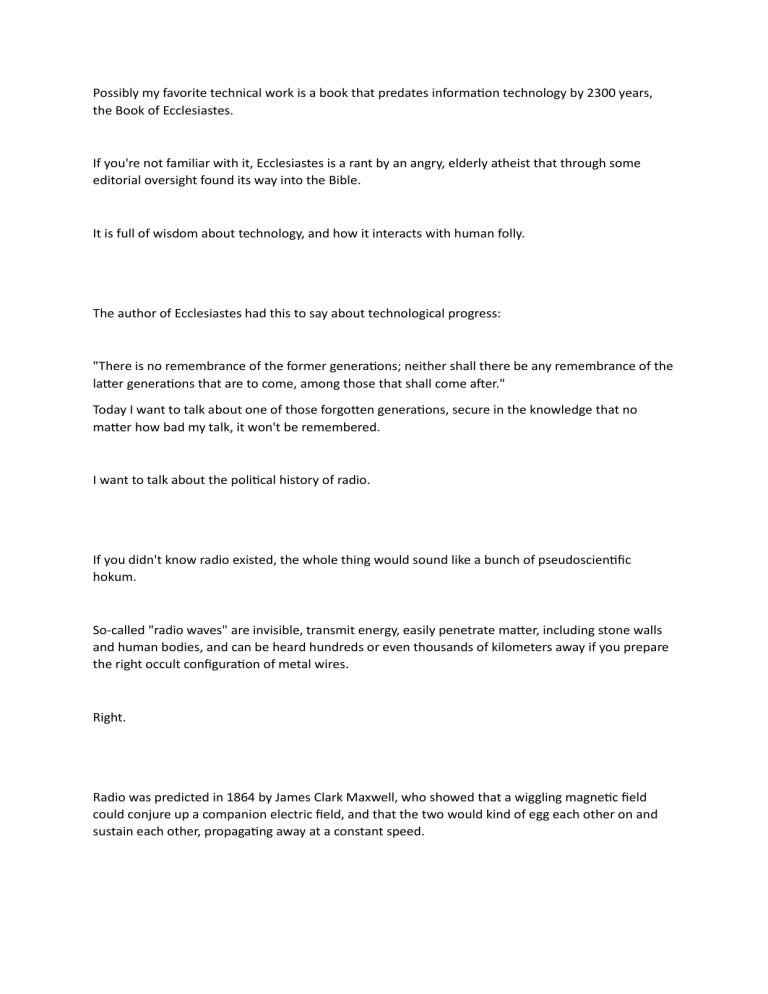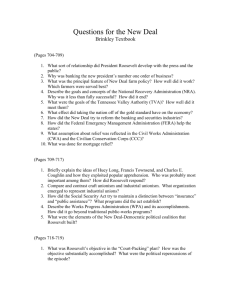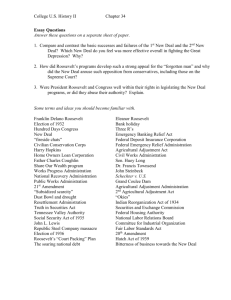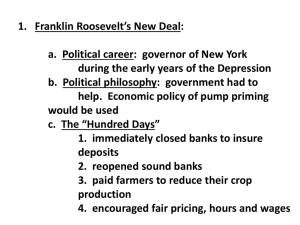
Possibly my favorite technical work is a book that predates information technology by 2300 years, the Book of Ecclesiastes. If you're not familiar with it, Ecclesiastes is a rant by an angry, elderly atheist that through some editorial oversight found its way into the Bible. It is full of wisdom about technology, and how it interacts with human folly. The author of Ecclesiastes had this to say about technological progress: "There is no remembrance of the former generations; neither shall there be any remembrance of the latter generations that are to come, among those that shall come after." Today I want to talk about one of those forgotten generations, secure in the knowledge that no matter how bad my talk, it won't be remembered. I want to talk about the political history of radio. If you didn't know radio existed, the whole thing would sound like a bunch of pseudoscientific hokum. So-called "radio waves" are invisible, transmit energy, easily penetrate matter, including stone walls and human bodies, and can be heard hundreds or even thousands of kilometers away if you prepare the right occult configuration of metal wires. Right. Radio was predicted in 1864 by James Clark Maxwell, who showed that a wiggling magnetic field could conjure up a companion electric field, and that the two would kind of egg each other on and sustain each other, propagating away at a constant speed. That speed just happened to be the observed speed of light. This was too much of a coincidence for Maxwell, who (correctly) posited that light itself must be an electromagnetic phenomenon. In 1886, Hertz demonstrated that these mutually sustaining waves were real, and could be detected. For a long time they were called Hertzian waves in his honor. (Asked about a practical use for radio, Hertz said "it's of no use whatsoever".) In 1895, Marconi built the first practical radio system, which could transmit and receive bursts of noise over a short distance—a wireless telegraph. Like the Internet, radio technology was on the horizon for a long time before it arrived, and it arrived in a rudimentary form that didn't strike anyone as a qualitatively new technology, let alone one that could upend politics. The world that radio arrived in already had ways to communicate in real time over long distances— telegraphs and telephones. It wasn't clear at the outset that Hertzian waves could be detected at distances much greater than a few hundred meters, let alone that they might become a practical method to transmit the human voice. At best, they might prove a useful method for detecting lightning at a distance, or communicating with ships at sea. The world that radio was born into had a group of telegraphy enthusiasts who ran their own little networks, the Usenet of their day. And there was also an assortment of thriving small-scale telephone networks, including rural ones where the telephone wires were run over barbed wire fencing, connecting thirty or forty farms on a circuit. Some of these people became the first radio "hams"—amateur hobbyists. The first radio sets used a spark gap and could only send buzzing sounds, so people communicated in Morse code. This was the "on the Internet, nobody knows you're a dog" period of amateur radio. Some intrepid women who found a way to make and operate a set enjoyed the freedom the pseudonymous radio subculture of the time offered them. We forget how complete the isolation was in rural areas in the days before mass media. Many of the most active radio enthusiasts lived out in the sticks, a dynamic that comes up again and again with new communications technologies. Over time, the range of these devices improved to where they could cover dozens of kilometers. People also learned how to amplify radio signals. The Navy became seriously interested in wireless sets as a military technology, and made them mandatory on ships. An article about how early radio hobbyists created headaches for the Navy conveys some of the flavor of this era: "When the wireless telegraph operator at the Portsmouth Navy Yard tried, a week ago last Saturday, to reach the fleet that was returning from its voyage around the world, he was able to catch only a single message, and that was from the cruiser Yankton a thousand miles in advance of the other ships. The trouble was that the air was full of unimportant electric messages sent by young amateur operators in the region of Boston. The number of such amateurs who are experimenting with this new form of telegraphy is surprising; and their feats are interesting and picturesque. One boy, for example, in a New York suburb, has a wireless installation which is practically entirely the work of his own hands. In the evening or after school hours he often sits at his instrument and "talks" with one or another of half a dozen of his friends who have similar installations, or "listens" at random to the messages with which the air is filled." A wonderful website called Early Radio History has collected a number of these articles. The read just like newspaper profiles of the early web pioneers, a mix of condescension at their nerdiness and appreciation of their technical achievements. The biggest difference in tone is that living in your mom's basement was considered a responsible sign of adulthood in 1912. It meant that you weren't out in the streets, doing God knows what, and might actually make something of yourself. News of the Titanic sinking in 1912 is slow to arrive in Washington, because so many people are trying to forward it at the same time, and the crosstalk slows the message down. At this point, President Taft starts grumbling about regulation. In 1914, war breaks out in Europe. Despite pleas from amateur radio hams, the American government bans all civilian radio use for the duration of the war. For five years, amateur radio is dead. The Navy even makes an attempt right after the war to buy out every radio operator and get a monopoly, until Congress slaps them down. The ban is lifted in 1919, precipitating a full-on radio boom very reminiscent of the dot-com bubble. Money starts pouring in. Everything is radio themed. There's young adult fiction being published about boys and girls who use radio to solve crimes and have adventures—the Radio Boys series. Fortunes are made and lost speculating on radio companies. Every business is told that radio will transform their lives. Jewelers, for example, will no longer have to lease a dedicated telegraph line to get an exact time signal for their high-end watches. Their trade journal publishes an article explaining what the ether is, how it works, how you send waves through it, and how you can save a bundle by getting your official time from the Navy radio transmitter at Arlington. But mass-market radio also means the end of the informal, participatory radio web that preceded it. Now you need a license and a budget to play the game. Corporations take over, and within a few years there are just a couple of giants running the national radio networks, to the point where one of them is broken up, back when breaking up monopolies was still a thing we did. The work becomes professionalized. The industry, which in the beginning had been run on a mix of enthusiasm and government money, finds its way to a workable business model: advertising. The big players wage a war over copyright to determine how artists should get paid for broadcasts over this new medium. In just a few years, radio completes the transition from an eclectic group of participatory amateurs, to a mass audience of passive consumers and a professional class of producers. It assumes its place along newsprint as a mass medium. But unlike newspapers or the telegraph, this new medium can reach into people's homes, and talk to them in a human voice. It doesn't take long for politically talented people to discover how to use radio for their own ends. One of these early pioneers in the United States is Charles Coughlin, a Catholic priest and early religious broadcaster who notices that his angry rants on political topics net him a much bigger audience than his discourses on religion. By the middle of the 1930's, Coughlin has an active audience of ten million tuning in to hear him rail against against bankers and international conspiracies, in a way that sounds uncomfortably familiar in 2017. Here's Father Coughlin at the top of his game, yelling about banks. The other great political radio talent in America is the new President, Franklin Roosevelt. Facing a hostile press controlled by his opponents, Roosevelt decides to speak directly to the people in a series of what he terms "fireside chats". These are not delivered in the bombastic style of political speeches, or in the angry right-wing talk radio style pioneered by Father Coughlin, but conversationally, as if the President were at home with you in your parlor. Roosevelt exploits the intimacy of radio, speaking to people gathered in their homes, in the evening, in the company of friends and loved ones. Here's what his first fireside chat sounded like. You wouldn't think that a lecture about the banking system could be very appealing. But in an atmosphere of crisis, people listen. For the first time, they can directly hear their leader discuss an issue of enormous consequence to their lives, in their own homes. These fireside chats help win Roosevelt a lasting popularity that will confound his enemies over the years. He will go on to win re-election three times. Saul Bellow wrote about what it was like to experience one of Roosevelt's broadcasts: drivers had pulled over, parking bumper to bumper, and turned on their radios to hear Roosevelt. They had rolled down the windows and opened the car doors. Everywhere the same voice, its odd Eastern accent, which in anyone else would have irritated Midwesterners. You could follow without missing a single word as you strolled by. You felt joined to these unknown drivers, men and women smoking their cigarettes in silence, not so much considering the President's words as affirming the rightness of his tone and taking assurance from it. Right there, in that Saul Bellow quote, we also find a warning about the danger of this intimate new medium. "Not considering but affirming." This is the power that radio has to persuade through emotion, repetition, familiarity, and tone, rather than facts or argument. A good radio broadcast makes you feel like a part of something bigger, even as you listen alone. Europe also finds a first-class radio genius, in the person of Joseph Goebbels, the Nazi propaganda minister. One of Goebbels's first acts after the Nazis seize power in 1933 is to start the production of cheap radios, the Volksempfänger, or "people's receiver". Goebbels believes it essential to the success of National Socialism that there be a radio in every home, and a loudspeaker at the workplace. At the same time as it is changing politics, radio technology revolutionizes the ability to make war. Portable radio sets give armies what they lacked in World War I—a way to communicate in real time while in motion. During the First World War, armies had been paralyzed by a lack of real-time communication. Battles were run by timetable, with no way to coordinate between soldiers and artillery. The Blitzkrieg tactics of World War II would not have been possible if every tank crew, without exception, had not had a radio. Radio would come to play a pivotal role in that war, as a weapon (radar was born in that war), a source of intelligence, a means of command, and a propaganda tool. At his trial after the war, Albert Speer argued that radio was also an essential prerequisite for the political rise of the Third Reich: Hitler's dictatorship differed in one fundamental point from all its predecessors in history. His was the first dictatorship that made the complete use of all technical means for domination of its own country. Through technical devices like the radio and loudspeaker, 80 million people were deprived of independent thought. Speer made this claim while on trial for his life, so it was in his interest to disclaim personal agency. But there is some truth mixed in with his dissembling. Radio was a force of persuasion different in kind from anything the world had seen before. Those who learned to use it first for political ends had a tremendous advantage. In less than four decades, radio had completed the journey from fledgeling technology, to nerdy hobby, to big business, to potent political weapon. This trajectory must have come as a shock to its pioneers. At its birth, it seemed like radio would only be a force for good. How could something that connects people together be anything but beneficial? Radio brought music into hospitals and nursing homes, it eased the profound isolation of rural life, it let people hear directly from their elected representatives. It brought laugher and entertainment into every parlor, saved lives at sea, gave people weather forecasts for the first time. But radio waves are just oscillating electromagnetic fields. They really don't care how we use them. All they want is to go places at the speed of light. It is hard to accept that good people, working on technology that benefits so many, with nothing but good intentions, could end up building a powerful tool for the wicked. But we can't afford to re-learn this lesson every time. During the Rwandan genocide in 1994, one radio station, Radio Télévision Libre des Mille Collines, is estimated to have instigated the deaths of 50,000 people. They radicalized and goaded on the killers with a mix of jokes, dance music, and hatred. It's no accident that whenever there's a coup, the first thing the rebels seize is the radio station. Technology interacts with human nature in complicated ways, and part of human nature is to seek power over others, and manipulate them. Technology concentrates power. We have to assume the new technologies we invent will concentrate power, too. There is always a gap between mass adoption and the first skillful political use of a medium. With the Internet, we are crossing that gap right now. It's possible that people like Putin, or the campaign that won the Brexit vote, or the Trump campaign in the United States, are the geniuses of this new medium, like Roosevelt was in his day. But I worry that they're just beginners. I don't think we've even seen a Father Coughlin of the Internet, let alone a Goebbels, when it comes to making effective political use of the technology we've deployed at scale. We're not taking the threat seriously. Google had a conference last week called Google I/O, where they showed off some truly amazing technology. The theme of it was AI in everything, both directly in their products, and by improving the tools they make available for everyone else. The subtext was that nothing but good could come out of moving these techniques into the real world as fast as possible. Left unsaid was the fact that to train the AI, and to fund the whole enterprise, you need a program of mass surveillance. It's significant to me that none of the companies that make their money from such surveillance are comfortable talking about their business model. But it's that business model that's enabling authoritarians. You don't get a clear warning that you're working on something that's bad for the world. They put you to work designing a machine that answers to "OK Google", not "OK Goebbels". And I bet even Goebbels' engineers could rationalize to themselves that the people's radio made lives better, and was an interesting engineering challenge. But being ashamed of your own business model is a clear warning that you’re not working on the side of the angels. Outcomes matter, not intentions. The Book of Ecclesiastes has this to say about mass surveillance: Do not revile the king even in your thoughts, Or curse the rich in your bedroom, Because a bird in the sky may carry your words, And a bird on the wing may report what you say. Our life now is full of these birds on the wing. Radios don't just talk to us anymore, they listen, and they know how to whisper algorithmically-targeted messages to us in ways we’ll find persuasive. It is a scary world we're building. And building it this way is a choice, not a necessity. We can't uninvent the Internet, but we can decide that the right way to fund it is not by building a Panopticon. I know you didn't come to this conference to hear a political talk. But the work you do matters a lot. Your choices matter a lot. To quote Ecclesiastes again: "As fish are caught in a cruel net, or birds are taken in a snare, so men are trapped by evil times that fall unexpectedly upon them." I want to finish with a true story from here in Poland. Jan Hanasz was one of a group of radio astronomers in the city of Toruń, and the leader of the Toruń branch of Solidarity, the trade union that was banned in 1981. In the fall of 1982, his underground chapter of Solidarity decided to make some broadcasts, to lift people's spirits. People in Warsaw had tried making illegal broadcasts from rooftops, but these transmitters were too easy for the Security Bureau to find by triangulation. The radio astronomers had a more clever idea. One of them calculated how far the broadcast from a low-powered radio transmitter could reach if it was suspended from a balloon, and the figure he came up with was surprisingly high—a few kilometers at least. The group thought about using weather balloons, but those would be too easy to trace. Instead, they settled on inflatable beach balls that could be purchased in a sporting goods store. A chemist colleague provided them with a supply of hydrogen, which they kept in a fire extinguisher. I like to imagine this extinguisher hanging on a hook in the lab, being used to prank people. "Hey Jacek, let me put out your cigarette!" Someone else in the group figured out how to make a lightweight antenna out of copper foil. The part they had the most trouble finding was a tape deck, not because it was suppressed by the Polish government, but because the Americans had put an embargo on advanced electronics. Eventually, a colleague in France arranged to send them used automobile tape decks that they could strip down to make as light as possible. As Hanasz describes it in an interview: "The underground press would announce broadcasts in advance. Sometimes they pasted flyers on walls. People knew to scan the UHF band at a certain hour. We didn't announce a specific frequency range so that there wouldn't be interference. The broadcasts began with a long call signal: "THIS IS RADIO SOLIDARITY TORUŃ", to give people time to tune their radios, followed by fifteen minutes of programming. The limiting factor was battery life. Quoting Hanasz again: It was a really safe undertaking—no one got caught. The Security Bureau boys knew about the broadcasts in advance because of our flyers. Radio direction finding vans roved around the city but couldn't pinpoint the transmitter. We were able to watch them search. Once they even wound up on the banks of the Vistula, completely lost. Seeing the Security Bureau so helpless brought laughter and satisfaction to people who were tired of the repression of martial law. In 1982, eleven clandestine Radio Solidarity radio stations were shut down across Poland. The scientists who cooperated in the balloon project were risking serious jail time in addition to the loss of their career and livelihood. Their act of defiance didn't bring down the state. It didn't do much more than give hope and brighten the day of a few hundred people. But it went straight back to that first idealistic promise of radio: that there existed magic, invisible rays that had the power to erase the distance between people, bypass all intermediaries, and penetrate even the thickest walls. I tell this story to reassure you that just because everything is heavy and political right now, it doesn't mean we can't also fight these fights on our own terms, as nerds. The Utopian qualities that made us love the web have not disappeared, even as it's become centralized and corporate, and we can find ways to defend and express them in our work. The important thing is to recognize that there is a fight, and a need for individual acts of creative resilience. We have to make sure that the powerful don't get comfortable using our tools. And we have to find ways to dismantle the surveillance economy before it becomes a poltical weapon turned against our democracy. I'd like to leave you with a final quote from Ecclesiastes. This one would be perfect for a graduation speech: "Whatsoever thy hand findeth to do, do it with thy might; for there is no work, nor device, nor knowledge, nor wisdom, in the grave, whither thou goest." I hope your journey to the grave is long and enjoyable! And I hope you find work to do that, in later years, you will turn back and look on with pride. Whether for good or bad, you are the pioneers in a field that is changing the world. The decisions that you make matter. Please think about that in the weeks and months to come, not just as tech workers, but as citizens and as fellow human beings. Thank you for your time!



